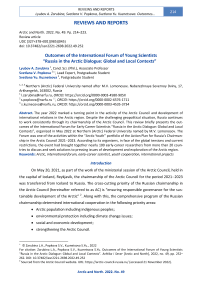Outcomes of the International Forum of Young Scientists “Russia in the Arctic Dialogue: Global and Local Contexts”
Автор: Zarubina L.A., Popkova S.V., Kuznetsova S.Yu.
Журнал: Arctic and North @arctic-and-north
Рубрика: Reviews and reports
Статья в выпуске: 49, 2022 года.
Бесплатный доступ
The year 2022 marked a turning point in the activity of the Arctic Council and development of international relations in the Arctic region. Despite the challenging geopolitical situation, Russia continues to work consistently through its chairmanship of the Arctic Council. This review briefly presents the outcomes of the International Forum for Early-Career Scientists “Russia in the Arctic Dialogue: Global and Local Contexts”, organized in May 2022 at Northern (Arctic) Federal University named by M.V. Lomonosov. The Forum was one of the activities within the “Arctic Youth” portfolio of the Action Plan for Russia’s Chairmanship in the Arctic Council 2021-2023. According to its organizers, in face of the global tensions and current restrictions, the event had brought together nearly 100 early-career researchers from more than 20 countries to discuss and seek solutions to pressing issues of development and exploration of the Arctic region.
Arctic, international forum, early-career scientist, youth cooperation, international projects
Короткий адрес: https://sciup.org/148329273
IDR: 148329273 | УДК: [327+378+001](985)(045) | DOI: 10.37482/issn2221-2698.2022.49.252
Текст научной статьи Outcomes of the International Forum of Young Scientists “Russia in the Arctic Dialogue: Global and Local Contexts”
On May 20, 2021, as part of the work of the ministerial session of the Arctic Council, held in the capital of Iceland, Reykjavik, the chairmanship of the Arctic Council for the period 2021-2023 was transferred from Iceland to Russia. The cross-cutting priority of the Russian chairmanship in the Arctic Council (hereinafter referred to as AC) is “ensuring responsible governance for the sustainable development of the Arctic” 2. Along with this, the comprehensive program of the Russian chairmanship determined international cooperation in the following priority areas:
-
• Arctic population including indigenous peoples;
-
• environmental protection including climate change issues;
-
• social and economic development;
-
• strengthening the Arctic Council.
The Chairman of the Government of the Russian Federation M.V. Mishustin approved the Action Program Plan for the Russian chairmanship of the Arctic Council in 2021–2023. 3 The plan includes 116 activities grouped into 11 sections. In 2021, 38 events were planned, in 2022 — 50, in the first half of 2023 — 28 [1, Zhuravel V.P.]. Due to the high urgency of the task of increasing the role of youth in addressing issues of the Arctic agenda, international youth cooperation platforms were singled out as a separate area “Arctic Youth”.
The year 2022 has become a turning point for the activities of the Arctic Council and the development of international relations in the Arctic region. Despite the difficult geopolitical situation, Russia continues its consistent work within the framework of the AC chairmanship.
Northern (Arctic) Federal University named after M.V. Lomonosov (Arkhangelsk) was determined as the venue for a number of events within the framework of the implementation of the “Arctic Youth” direction: the international forum of young scientists “Russia in the Arctic dialogue: global and local contexts” (May 2022), the student summit on preservation and maintenance of the ecology of the Arctic region (June 2022), the international youth model of the Arctic Council (November 2022), the festival of youth creativity of the Arctic Council (November 2022).
This review presents the results of the largest-scale event by the scope of the participating countries — the international forum of young scientists “Russia in the Arctic Dialogue: Global and Local Contexts”, which was held at NArFU from May 25 to May 27, 2022.
Event concept
One of the key challenges in the Arctic is the development of human capital and the training of personnel with a high level of competence for the exploration and development of the Arctic, ready to cooperate in industrial projects at the national and global levels. In this regard, the overall objective of the Forum was to develop youth scientific and educational cooperation and popularize the geographical, environmental, ethno-cultural and historical identity of the Russian Arctic among the international youth community.
Target group: postgraduate students, master’s students, undergraduate and graduate students of Russian and foreign universities.
Event partners: Ministry of science and higher education of the Russian Federation, Ministry of the Russian Federation for the development of the Far East and the Arctic, Corporation for the development of the Far East and the Arctic, the Alexander Gorchakov Public Diplomacy Fund, Russian and foreign partner universities and research centers.
The concept of the event reflected the priorities of the program of the Russian Chairmanship in the Arctic Council, addressing, in particular, the following key issues:
-
• Arctic strategy of the Russian Federation up to 2035;
-
• environmental challenges and risk management in the Arctic;
-
• local communities in the changing Arctic environment;
-
• transport systems and logistics in the Arctic;
-
• geopolitics and international relations in the Arctic.
The main tasks included:
-
• contribution to the training of future leaders of the Arctic region; enhancing students’ professional knowledge of Arctic development issues;
-
• involvement of participants in solving the global challenges of the Arctic through participation in the interdisciplinary international projects on the most pressing issues of the Arctic development;
-
• ensuring the promotion of the Russian Arctic agenda and the formation of a positive image of Russia in the international scientific space;
-
• strengthening of international youth cooperation and development of scientific diplomacy in the Arctic in the changed conditions.
Event structure
The three-day program of the Forum was held in a hybrid format (online and offline tracks), included several thematic areas, discussion sessions and a program of cultural events.
Track I: Forum of young scientists in full-time format at NArFU, Arkhangelsk. The working language was Russian.
The program included the “Arctic Lecture Hall” — a series of lectures from leading Russian scientists and experts in the field of Arctic research, events at regional venues in the Arkhangelsk Oblast, cultural and educational activities and the excursion program “Discovering the Russian North”. An interactive format was the “Project Laboratory” platform, which brought together students to develop joint project initiatives to address the common challenges of the Arctic. Student projects were created as part of the work of international teams, supervised by mentors from among experienced international project managers.
Track II: International PhD School in online format. The working language was English.
The program was aimed at working with young researchers, providing opportunities to expand scientific knowledge about the Russian Arctic for PhD students from around the world, to exchange views on the existing challenges of the region and possible vectors for building scientific collaboration, as well as to present their research in a peer-review format, involving leading Arctic experts from Russia and foreign countries.
General results of the Forum
The authors of the article summarized and presented the results of the event, as well as the prospects for its holding on an annual basis.
Overall, more than 100 people from 24 countries, including the countries of the Arctic Council and AC observer states, took part in the Forum venues. The total attendance in terms of online platform views was more than 500 people. The geography of the Forum included the following countries: Argentina, Algeria, Armenia, Belarus, Great Britain, Ghana, Germany, India, Indonesia, Jordan, Italy, Cameroon, Kazakhstan, Kyrgyzstan, China, Mexico, Moldova, Russia, Romania, Senegal, Syria, USA, Tanzania, Turkey, Uzbekistan.
The offline platform of the Forum of young scientists in Arkhangelsk brought together Russian and foreign undergraduate and graduate students from 11 countries, studying in the areas of humanities and natural sciences at 26 Russian universities.
18 young researchers from 12 countries became participants of the Online Postgraduate School. Leading arctic scientists from Russia, China, Norway, and Switzerland acted as lecturers and scientific opponents.
The lecture block of the Forum (“Arctic Lecture Hall”) was opened by a plenary session that brought together participants from all Forum sites. “The forum is intended to set a constructive start to the processes of scientific diplomacy in the difficult foreign policy situation that the whole world is experiencing today,” said Elena Kudryashova, Rector of NArFU, at the opening of the event 4.
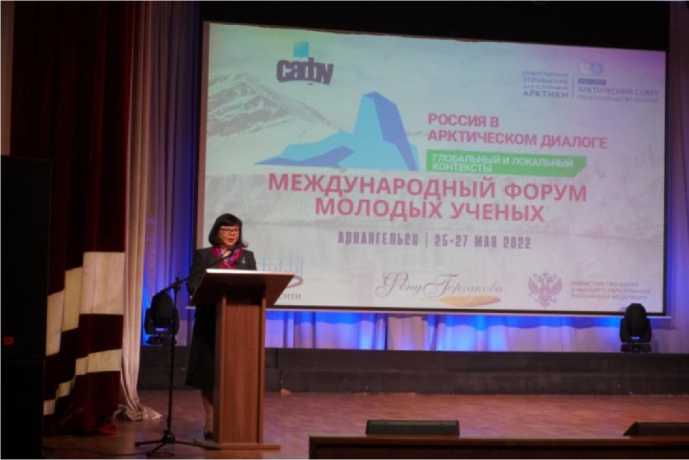
Fig. 1. Opening ceremony of the Forum. Elena Kudryashova, Rector of NArFU. May 25, 2022 Arkhangelsk.
Natalya Vyakhireva, expert and program manager of the Russian International Affairs
Council, noted the relevance and significance of the Forum in her plenary report “Is the Arctic Council possible without Russia?”. “Shortly after the start of the special operation, the seven participating countries of the Arctic Council announced the suspension of participation of their repre- sentatives in all official events of the Arctic Council. However, Russia continues its consistent work within the framework of its AC chairmanship. As of today, the future of the Arctic Council is very uncertain. But at the same time, it is obvious that the solution of many challenges of the Arctic in the field of economy, ecology, health care, and prevention of emergency situations is not possible without the participation of Russia. Now it is very important to preserve those channels of dialogue that can be maintained today and at all levels where possible. Therefore, holding the Forum of Young Scientists right now is especially important and valuable” 5. The plenary report largely set the general rhetoric of the event and became the basis for further scientific discussions.
Leading scientists from the Russian International Affairs Council, Moscow State University named after M.V. Lomonosov, St. Petersburg State University, the Corporation for the Development of the Far East and the Arctic, the World Wildlife Fund, the Russian Arctic National Park, the Northern (Arctic) Federal University and a number of universities and research centers of the Russian Arctic participated as key speakers and experts in the lecture series of the Forum. The topics of the lectures corresponded to the priorities of the Forum and provided the information to comprehend the following key issues: the main directions of the Strategy for the development of the Arctic zone of the Russian Federation up to 2035, the development of the Arctic in terms of the theory of the technological order, the legal regime of the Arctic, climate change, the artistic rethinking of the North, the policy transformation of the USA in the Chinese direction, Arctic scientific diplomacy.
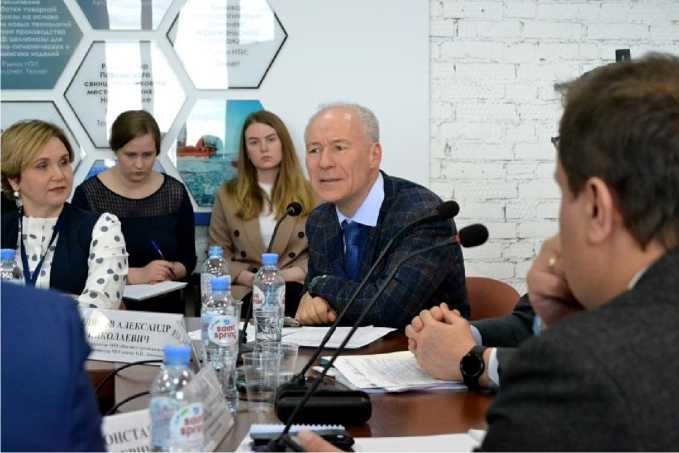
Fig. 2. Speech by Aleksandr Pilyasov, General Director of ANO “Institute of Regional Consulting”, Professor of Lomonosov Moscow State University, May 25–27, 2022. Arkhangelsk.
Separate formats that aroused great interest among young people were meetings with outstanding people whose fates are connected with polar expeditions. Hero of Russia Mikhail
Georgievich Melekhov shared his memories of organizing and conducting scientific expeditions in high latitudes with the future leaders of the Arctic. The cultural and educational program “Discovering the Russian North” on the basis of regional museums and the representative office of the National Park “Russian Arctic” made it possible to acquaint participants with the cultural and natural heritage of the Arkhangelsk Oblast. The presentation of the NArFU research project “Arctic Floating University” 6 opened new opportunities for Russian and international students to participate in scientific expeditions to the Arctic seas.
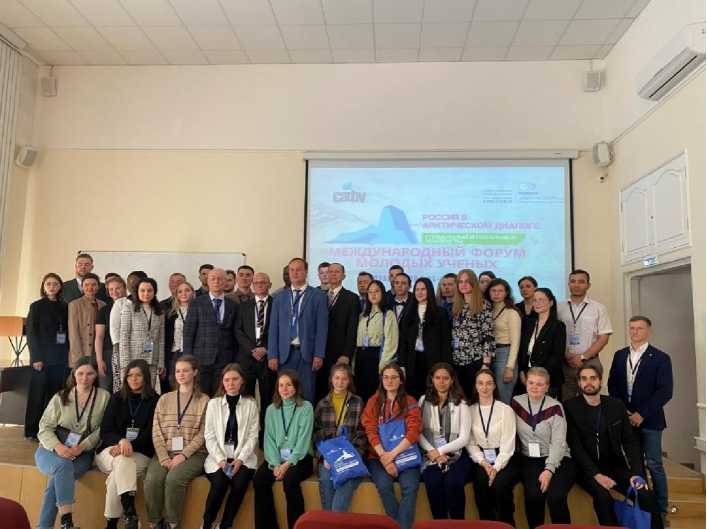
Fig. 3. Forum participants. Arctic Lecture Hall. May 25–27, 2022. Arkhangelsk.
“Project Laboratory”
According to the organizers, it was important not only to increase the level of students’ knowledge about the Arctic by providing lecture material, but also to ensure an interactive format for the event, involve participants in active dialogue and direct engagement in the search for solutions to the key challenges of the Arctic region. These tasks were solved through the organization of the “Project Laboratory” platform, which brought students together to develop group project initiatives. Student projects were created as part of the work of international teams on the following thematic axes:
-
• Arctic: to leave or to stay;
-
• Arctic: to preserve or to develop;
-
• ecology and climate change in the Arctic;
-
• Arctic cultural heritage;
-
• role of universities in the Arctic development.
The effective implementation of this platform and mentoring of the participants were facilitated by the considerable experience of the university’s international project activities accumulated as a result of international projects under the EU-Russia cross-border cooperation programs and other foundations [2, Kudryashova E.V., Zarubina L.A.], [3, Kudryashova E.V., Zarubina L.A., Popkova S.V., Baikina N.V.], [4, Zaikov K.S., Zarubina L.A., Popkova S.V., Kuprikov N.M., Kuprikov M.Yu., Kvon D.A., Ponyaev L.P.], [5, Kalinina M.R., Zarubina L.A.], [6, Zarubina L.A., Popkova S.V., Kudryashova E.V.].
Eight student teams, guided by experienced mentors, generated ideas and offered their visions for solving the acute challenges of the global Arctic.
As a result of three days work, the following student initiatives were presented to the jury (Table 1):
Table 1
Projects — student initiatives
|
Project |
Aim |
|
Project “Island of rescue” |
Reducing mammal mortality from melting ice by developing artificial platforms as resting places for marine mammals. |
|
Project “Arctic routes” |
Raising awareness of young people around the world about the Arctic region and its challenges, taking into account new geopolitical realities and changing partnership vectors. |
|
Project “Human being is the key resource of the Arctic” |
Making the Arctic zone more attractive to live and work by finding mechanisms to attract young people to the Arctic region and identifying positive experiences in Arctic development activities. |
|
Project “Sustainable Arctic: green fuel” |
Assessing the prospects for sustainable socio-economic development of the Arctic regions through the introduction of low-carbon technologies for capturing and using carbon. |
|
Project “Assessment of the impact of iceberg disposal on microorganisms in the Arctic zone” |
Studying the effect of iceberg disposal on microorganisms. |
|
Project “Technology center in the Arctic Region” |
Improving the quality of life of the able-bodied young population of the Arctic region in the context of a constant outflow of the population from the North. |
|
Project “Generation Arctic” |
Creation of a career guidance platform for talented young people, aimed at attracting applicants to Arctic universities. |
|
Project “The Arctic around you” |
Preservation and promotion of the cultural heritage of the Arctic by creating a single website aggregating the diversity of the cultural heritage of the Arctic regions by topics: architecture, crafts, cuisine, costumes, folklore. |
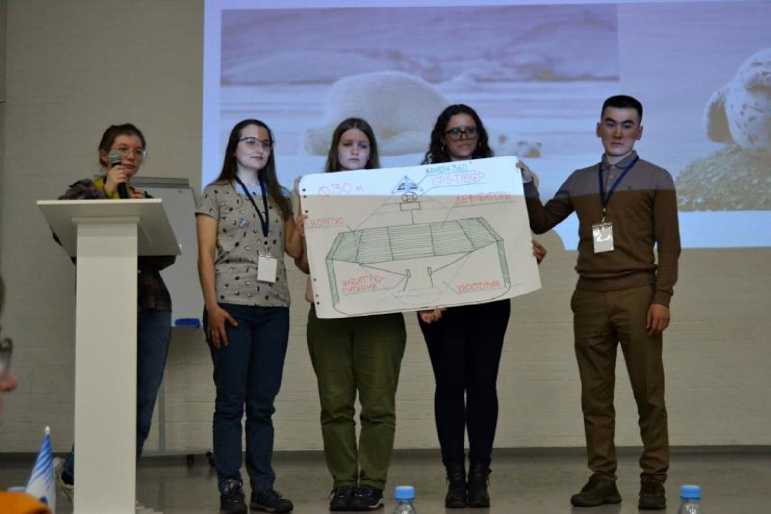
Fig. 4. “Project Laboratory”. Project initiatives defense. May 27, 2022.
Representatives of the Government of the Arkhangelsk Oblast, the Arkhangelsk Regional Branch of the Russian Geographical Society, Laverov Federal Center for Integrated Arctic Research of the Ural Branch of the Russian Academy of Sciences, Department of Training and Certification of Scientific and Pedagogical Staff of NArFU, Murmansk State Technical University were invited to evaluate the student projects.
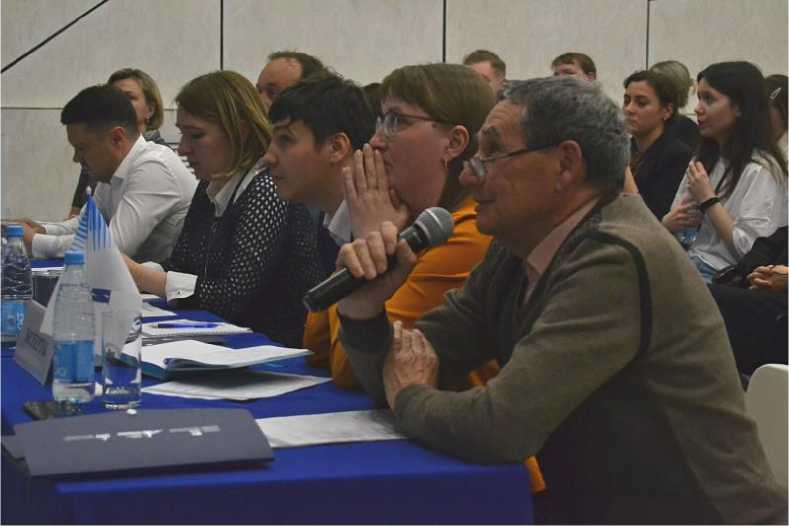
Fig. 5. “Project Laboratory”. Project initiatives defense. May 27, 2022.
The projects were highly appreciated by the jury and were recommended for further development and practical implementation including with the support of the university and the Government of the Arkhangelsk Oblast.
Conclusions
Summing up the results of the international forum of young scientists “Russia in the Arctic Dialogue: Global and Local Contexts”, it can be noted that the interdisciplinary nature of the event program made it possible to unite future specialists from various scientific fields and organize an interesting international educational platform on a large scale. The topics of the Forum covered a wide range of issues and allowed participants to expand their knowledge on various aspects of Russian and global Arctic development, to learn about major scientific and industrial projects in the region, to discuss topical issues in the development of the Arctic with experts, and to model their own vision of contemporary Arctic challenges and propose ways to solve them in the format of project team interaction between the participants of the face-to-face platform of the Forum and peer review of research work as part of the Postgraduate School.
The combination of organizational models (parallel tracks in online and offline format) made it possible to minimize the risks associated with epidemiological restrictions and provide an expanded composition and geography of participants, as well as to test new educational formats and communication models.
The organizers of the Forum are convinced that in the current geopolitical situation this international discussion platform was very important and symbolic, as it clearly demonstrated that science and education remain the language of dialogue. Therefore, holding the Forum on a regular basis could systematically promote an open constructive dialogue, the search for solutions across the entire spectrum of the integrated development of the Arctic region in the interests of ensuring stability and sustainable development of the Arctic for all its inhabitants.
For its part, NArFU as the organizer of the event confirmed its readiness to hold an international forum on an annual basis. The social significance of the event is determined by the Decree of the President of the Russian Federation dated April 25, 2022 No. 231 on the Decade of Science and Technology 7: attracting talented youth to research and development, promoting the involvement of researchers and developers in solving the most important tasks of the development of society and the country, increasing the availability of information about the achievements and prospects for the development of science for Russian citizens, as well as issues of patriotic education of young people.
Список литературы Outcomes of the International Forum of Young Scientists “Russia in the Arctic Dialogue: Global and Local Contexts”
- Zhuravel V.P. O predsedatel'stve Rossii v Arkticheskom sovete (2021–2023 gg.): programma, riski i uroki dlya EAES [On the Russian Chairmanship of the Arctic Council (2021-2023): Program, Risks and Lessons for the EAEU]. Bol'shaya Evraziya: razvitie, bezopasnost', sotrudnichestvo, 2022, no. 5–1, pp. 101–105.
- Kudryashova E.V., Zarubina L.A. Mezhdunarodnaya proektnaya deyatel'nost' kak instrument region-al'nogo razvitiya i stimulirovaniya sotrudnichestva (na primere uchastiya Arkhangel'skoy oblasti v programme prigranichnogo sotrudnichestva «Kolarktik») [International Projects as a Tool of Re-gional Development and Cooperation Enhancement (Case of Arkhangelsk Region Participation in Kolarctic CBC Programme)]. Vestnik Severnogo (Arkticheskogo) federal'nogo universiteta. Ser.: Gumanitarnye i sotsial'nye nauki [Vestnik of Northern (Arctic) Federal University. Ser.: Humanitarian and Social Sciences], 2018, no. 6, pp. 88–97. DOI: 10.17238/issn2227-6564.2018.6.88
- Kudryashova E.V., Zarubina L.A., Popkova S.V., Baykina N.V. Potentsial mezhdunarodnoy proektnoy deyatel'nosti dlya razvitiya universiteta [Potential of International Project Activity for University De-velopment]. Vysshee obrazovanie v Rossii [Higher Education in Russia], 2020, vol. 29, no. 7, pp. 125–134. DOI: 10.31992/0869-3617-2020-29-7-125-134
- Zaikov K.S., Zarubina L.A., Popkova S.V., Kuprikov N.M., Kuprikov M.Yu., Kvon D.A., Ponyaev L.P. Joint Innovative Research Agenda for The Arctic: Programs, Projects, Success Stories. Sustainability, 2021, no. 13(21), p. 11669. DOI: 10.3390/su132111669
- Kalinina M.R., Zarubina L.A. Mezhdunarodnoe arkticheskoe sotrudnichestvo. Opyt Severnogo (Ark-ticheskogo) federal'nogo universiteta [International Arctic Cooperation. Experience of the Northern (Arctic) Federal University]. Arkticheskie vedomosti [The Arctic Herald], 2015, no. 3 (14), pp. 92-101.
- Zarubina L.A., Popkova S.V., Kudryashova E.V. University as a Think-Tank for International Projects Activity in the Arctic. Electronic Collected Materials of XII Junior Researchers’ Conference, 2021, pp. 67–70.

